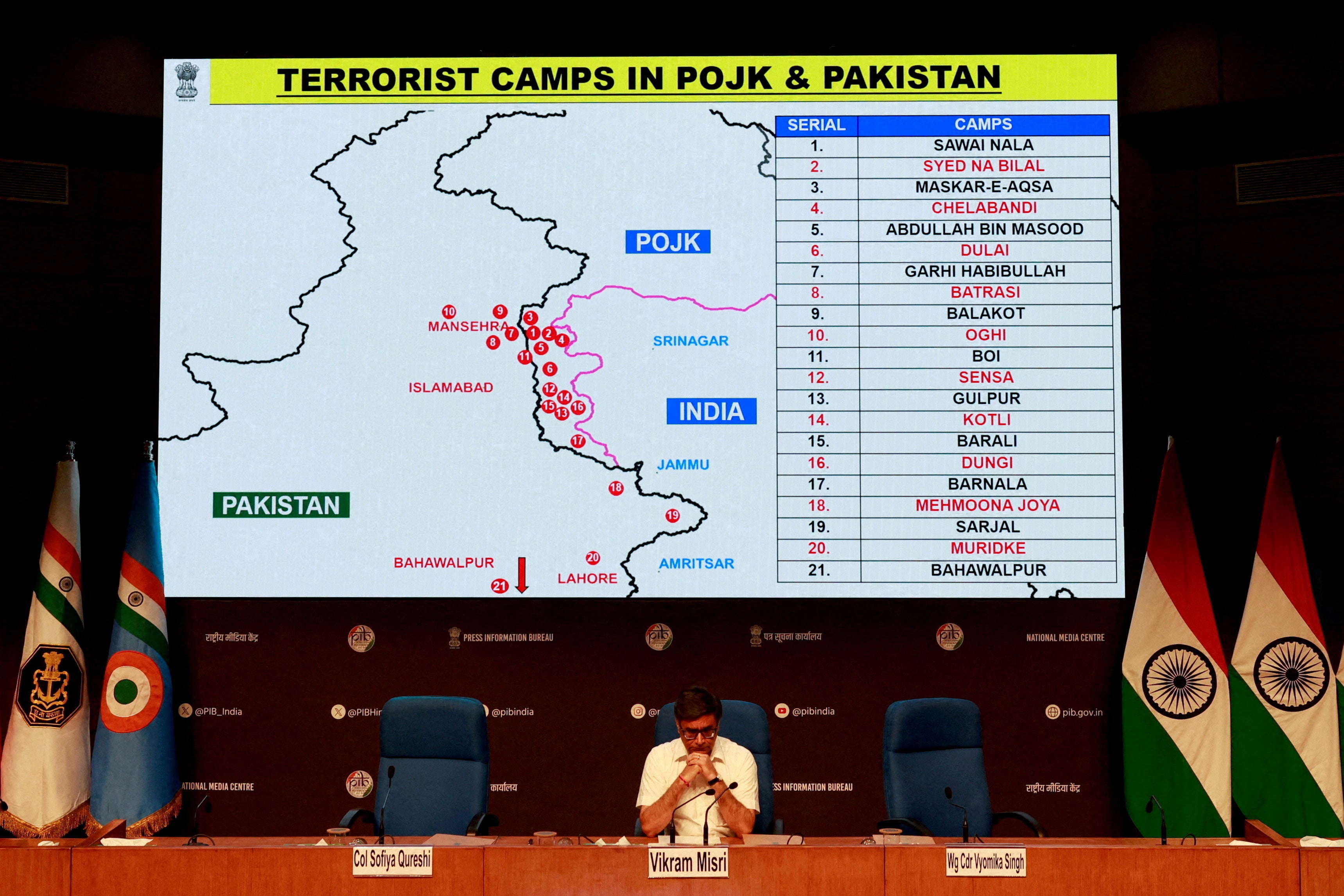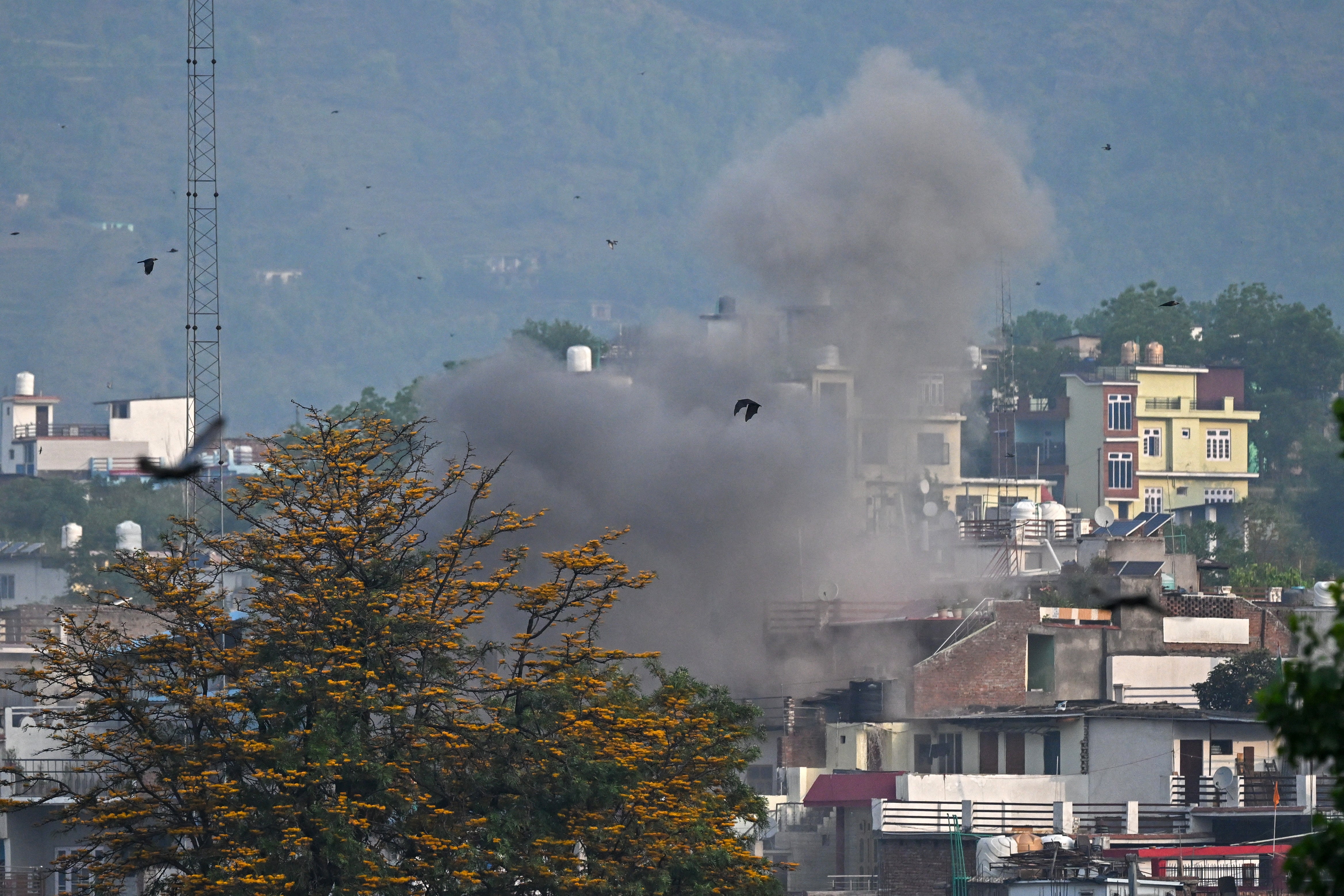ARTICLE AD BOX
Allies of New Delhi and Islamabad called for restraint and diplomacy after India conducted military strikes inside Pakistan early on Wednesday, dramatically escalating the risk of a wider conflict between the nuclear-armed neighbours.
Some countries offered cautious support for India’s claim of countering terrorism following the missile strikes in Pakistan, which New Delhi had blamed for a terror attack in Kashmir last month.
India claimed that it struck nine “terror camps” across seven cities in Pakistan in retaliation for the 22 April attack at a tourist town in Kashmir that left 26 people dead, mostly Hindu tourists.
The attack in Pahalgam was one of the deadliest ever on civilians in the Himalayan region roiled by separatist violence.
Follow The Independent’s live coverage of India-Pakistan tensions.
India and Pakistan have fought two wars over Kashmir – which they both control only in part but claim in whole – and New Delhi has long accused Islamabad of backing the armed separatist struggle against its rule that started in the late 1980s.
The missile strikes and the subsequent exchange of shelling along the border caused fatalities, with Islamabad putting its death toll at 26 and India at 10.
US president Donald Trump described rising tensions in the subcontinent as a “shame” in one of the first responses to the attack that happened late Tuesday US time.
"It is a shame, we just heard about it," he told reporters at the White House. "I guess people knew something was going to happen based on a little bit of the past. They have been fighting for a long time."
The president said he hoped “it ends very quickly”.
US secretary of state Marco Rubio, who was briefed by Indian national security adviser Ajit Doval following the strikes, said he was "monitoring the situation between India and Pakistan closely". He added that Washington would continue to engage the South Asian neighbours towards a “peaceful resolution”.
“India has credible leads, technical inputs, testimony of survivors and other evidence pointing towards the clear involvement of Pakistan-based terrorists in this attack," its embassy in Washington declared in a statement about Mr Doval’s call with Mr Rubio.

British foreign secretary David Lammy "reached out" to his counterparts in India and Pakistan after the strikes, one of his cabinet colleagues said.
“Our message would be that we are a friend, a partner to both countries. We stand ready to support both countries. Both have a huge interest in regional stability, in dialogue, in de-escalation and anything we can do to support that, we are here and willing to do," trade secretary Jonathan Reynolds told the BBC.
The Foreign Office updated its travel advice for the region, warning British nationals against going near the India-Pakistan border or into Pakistan’s Balochistan province.
The strikes came shortly after India and the UK agreed to boost bilateral trade by £25bn in what would be Britain’s biggest post-Brexit trade agreement.

China, an ally of Pakistan and rival of India, sought to strike a balanced tone by expressing regret over the missile strikes and simultaneously denouncing terrorism.
“China expresses regret over India's military actions this morning and is concerned about the current developments,” the foreign ministry said in a statement. “China opposes all forms of terrorism.”
Beijing called on New Delhi and Islamabad “to prioritise peace and stability, remain calm and restrained, and avoid taking actions that further complicate the situation”.
Analysts said China could play a key role in de-escalating the situation given its interest in regional stability and economic investments in Pakistan.
China is the largest investor in Pakistan by far, with the China-Pakistan Economic Corridor a cornerstone of its economic strategy in the region.
At the same time, China has multiple border disputes with India, including in the northeastern part of the Kashmir region.

The UAE called on India and Pakistan “to exercise restraint and de-escalate tensions”. Foreign minister Abdullah bin Zayed Al Nahyan stressed the importance of dialogue and mutual understanding to prevent military escalation, strengthen stability in South Asia, and avoid further regional tensions.
The UAE, a key partner of both countries, stressed that “diplomacy remains the most effective means of peacefully resolving crises”.
Israel, a close ally of India, supported the missile strikes. “Israel supports India’s right for self-defence. Terrorists should know there’s no place to hide from their heinous crimes against the innocent,” Israeli ambassador Reuven Azar posted on X.
Japan’s chief cabinet secretary Yoshimasa Hayashi said Tokyo was “deeply concerned this incident could incite retaliation and escalate to a full-scale military conflict”. He urged the two neighbours “to exercise restraint and stabilise the situation through dialogue”.
Russia said it was deeply concerned about the growing military confrontation. The foreign ministry called on both countries to show restraint, state media TASS reported.
Moscow enjoys warm relations with both India and Pakistan, but has historically been closer to New Delhi, a major buyer of its weapons.
Indian prime minister Narendra Modi has not spoken about the strikes yet, but has reportedly postponed his trip to Croatia, The Netherlands, and Norway.
His foreign minister S Jaishankar said the world “must show zero tolerance for terrorism” in a one-line response on X, sharing an image with the words “Operation Sindoor”, the name given to the military action.
Pakistani prime minister Shahbaz Sharif, meanwhile, said his country had “every right to give a robust response to this act of war imposed by India”.
“And a strong response is indeed being given,” he said.









 English (US) ·
English (US) ·